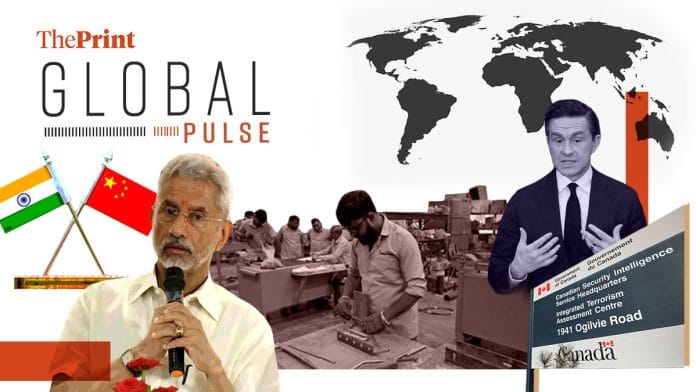New Delhi: Reports of the Indian government meddling in previous Canadian elections has put India front and centre in the upcoming Canadian elections.
According to The Globe and Mail, Canadian intelligence officials have alleged that Indian agents and proxies raised money and organised support for Pierre Poilievre, the Conservative Party leader, during the party leadership race in 2022. Indian agents were “involved in raising money and organizing within the South Asian community for Mr. Poilievre”, the report says.
Poilievre is the main challenger to Prime Minister Mark Carney in the general elections on 28 April.
In the report, titled ‘CSIS alleges India organized support for Poilievre’s 2022 Conservative leadership bid,’ Robert Fife and Steven Chase report that while there’s no evidence that Poilievre was aware of the interference—or if it eventually influenced the outcome of the leadership race—Canadian intelligence did not inform Poilievre of India’s involvement because he “lacked the necessary security clearance”.
Canadian intelligence said that the “government of India has the intent and capability to interfere in Canadian communities and democratic processes, to assert its geopolitical influence,” according to The Globe and Mail.
Reacting to the revelations, Poilievre, at a news conference, said that he “won the leadership fair and square”.
A yearlong public inquiry into foreign interference in Canadian politics identified India and China as main actors, with India supporting candidates “believed to be pro-India”, the report adds.
“The public inquiry into foreign interference, which held hearings in 2024 and was headed by Justice Marie-Josée Hogue, cited China and India as the main foreign interference actors in Canada, saying they use diplomats and proxies to meddle in Canadian domestic affairs.”
“In regard to India, Justice Hogue said in her final report in January that proxy agents clandestinely provide ‘illicit financial support to various Canadian politicians in an attempt to secure the election of pro-India candidates or gain influence over candidates who take office’,” The Globe and Mail reports.
“Indo-Canadian relations went into a deep freeze in September, 2023, when Mr. Trudeau accused agents of India and their proxies of being behind the slaying of Canadian Sikh activist Hardeep Singh Nijjar,” the article says.
India also has tense relations with the Liberal Party, The Globe and Mail reports, who it has accused of coddling Sikh-Canadians who support the idea of a separate Sikh state. On the other hand, India has had friendly relations with the Conservative Party.
The BBC reports on a question that has confounded policy makers for years: “What will it take for India’s private companies to begin investing in building new factories and firms?”
In the article ‘Why are India’s private firms not investing despite record profits?’, Nikhil Inamdar reports that private sector investments in India’s economy have dipped to a “decadal low of 33 percent this financial year”.
“Weak domestic consumption in urban areas, muted export demand and an influx of cheap Chinese imports in some sectors were among the factors,” reports the BBC. “But beyond the more immediate reasons, private investment impulse has been low because of ‘global uncertainties and overcapacity’, India’s economic survey pointed out earlier this year.”
Investments by companies in assets like factories, machinery or construction—also called gross fixed capital formation—make up around 30 percent of the Gross Domestic Product (GDP). The big problem, according to experts in the report, is a lack of demand in the economy to justify putting up additional capacities.
“India’s post-pandemic recovery has been uneven, with the consumer class not expanding quickly enough. Demand for goods and services has thus been hit, with spending capacity further curtailed by a fall in wages, even though corporate profitability has soared to a 15-year high this year,” the BBC reports.
Things could take a turn, the report says. Interest rate cuts, as well as a $12 billion income tax relief provided to individuals in the budget, will boost domestic consumption. “India’s central bank also says more private companies have shown an intention to invest this year compared to last year, although how much of that intent results into actual money deployed remains to be seen,” the article adds.
Meanwhile, Global Times reports on the 33rd Meeting of Working Mechanism for Consultation and Coordination on China-India Border Affairs in Beijing, on the occasion of the 75th anniversary of India and China establishing diplomatic ties. The report is titled ‘China-India issues can be addressed without conflict, says Indian top diplomat; observers see 75th anniversary as chance to restore healthy ties.’
It quotes External Affairs Minister S. Jaishankar saying India and China will find ways to address issues that come up in the foreseeable future and adds that “India is sending positive signals toward improving ties with China, reflecting a strategic shift amid evolving global and regional dynamics”.
“As 2025 marks the 75th anniversary of diplomatic ties, China and India are expected to seize the opportunity to enhance high-level engagement, gradually resume dialogue mechanisms, deepen economic and trade cooperation, and promote people-to-people exchanges,” reports Deng Xiaoci, before summarising all the key developments in India-China ties since the thaw at the border late last year.
“Both sides have identified 2025 as a key milestone for improving ties. Seizing this opportunity, China and India are expected to enhance high-level engagement, gradually resume dialogue mechanisms, deepen economic and trade cooperation, and promote people-to-people exchanges, laying a solid foundation for the steady development of bilateral relations and fostering a more amicable atmosphere for China-India relations to return to a healthy trajectory,” the Global Times concludes.
(Edited by Sanya Mathur)
Also Read: India’s talent beckons US firms & Kunal Kamra row shows political comedy has ‘little room’ in India






